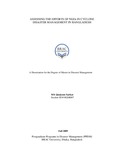Assessing the efforts of NGOs in cyclone disaster management in Bangladesh

View/Open
Date
2009-09Publisher
BRAC UniversityAuthor
Sarkar, MA QuaiyumMetadata
Show full item recordAbstract
Whenever disasters strike, they do not discriminate or differentiate - they cause havoc
and distress. They strike countries' rich and poor affect both men and women, old and
young and cause destruction leaving behind a trail of devastation and irreparable
losses. When these hazards strike, the communities are the first to react, irrespective
of their profession, status, cast or culture. NGO's are Non-profit organizations or
associations of private citizens with a common interest to assist the disaster affected
people. The role of NGOs, especially with relief and rehabilitation programs, during
and after disasters is to complement governmental efforts in Bangladesh. In principle,
NGOs are responsible to assist the government in implementing national programs
successfully. This study aims to assess the efforts of NGOs in cyclonic disaster
management in Bangladesh. Coastal belts as cyclone disaster prone areas were
included mostly for analysis. Study focused on response, recovery, rehabilitation, and
affected community people. CARE Bangladesh, BRAC, and Muslim Aid Bangladesh
were included mainly for the study. Data were collected based on secondary sources.
Both qualitative and quantitative research approach were applied for the study. The
study showed that about 20% of the assistance to emergency response, recovery, and
rehabilitation during 1970 cyclone disaster was ensured by NGOs both national and
internationals and it was more than 40% in 1991 cyclone disasters. Role of CARE
Bangladesh, BRAC, and Muslim Aid Bangladesh to SIDR disaster management
especially with emergency response, recovery, and rehabilitation activities was
significant. CARE Bangladesh focused its response activities in four of the most
affected upazilas in Bagerhat and Barguna districts. BRAC responded to the
devastation in 30 upazilas (sub-districts) of 9 cyclone-Sidr affected districts of
Southern Bangladesh. Muslim Aid Bangladesh focused its response, recovery, and
rehabilitation activities intensely in three of the four worst affected areas (Bagerhat,
Patuakhali, and Pirojpur). Presently, NGOs are giving emphasis on work with
preventive measures as a strategy of disaster risk reduction.
